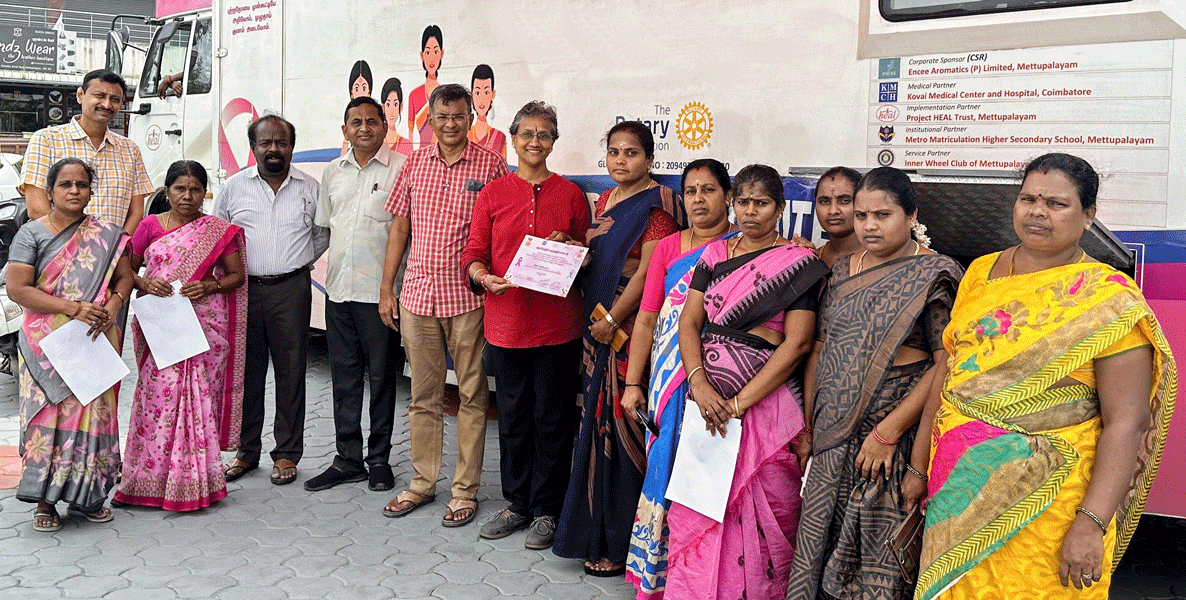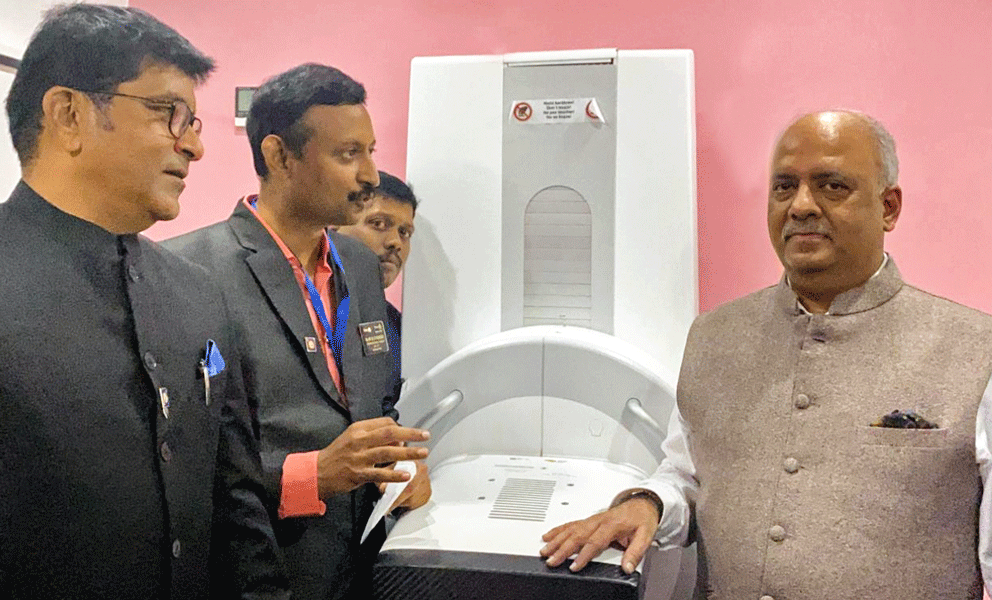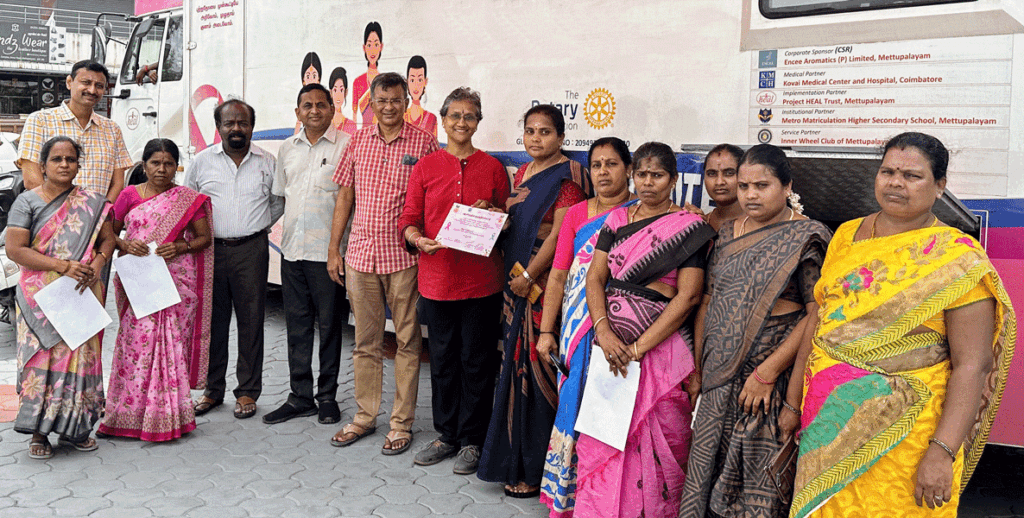

Vimala (49), a farm hand, was unaware that she had cancer until she was examined at the mobile cancer screening unit, being run by RC Mettupalayam, RID 3203.
The mammography bus had come to her neighbouring village near Coimbatore, Tamil Nadu, to screen women for breast and cervical cancer. “I was asymptomatic, hence did not feel the need to go through such a medical procedure. But following an awareness campaign by Rotarians, I went for the screening inside the diagnostic bus. I was shocked to know that I had an early-stage cancerous lesion on the cervix.” She then underwent a minor surgery to remove the lesion at a hospital in Coimbatore. Ditto is the case of Rani (58), her friend, who was detected with a tumorous lump in her breast at the Rotary camp.
Project HEAL — High awareness, Early detection, Affordable treatment and Low mortality — has so far conducted over 100 mobile cancer screening camps benefiting 4,000 women (through over 6,000 screenings). “Among those screened, 500 were referred for further tests, scans and evaluation at the Kovai Medical Centre and Hospital (KMCH), our partner in this mega initiative to screen rural women for cancer,” says Dr D Vijayagiri, child specialist-cum-laparoscopic surgeon who conceived of and started the cancer detection camps during his tenure as club president (2019–20). During the tests at the KMCH, 40 women were found to have early stage cancer, “and all of them either underwent surgery or follow-up treatment at the hospital,” he says.
Major hurdles
Recalling the initial hurdles in the way of the mobile cancer care bus, Project HEAL Trust chief operating officer Suresh Ananthakrishnan says, “we formed this Trust in December 2019 and placed an order for a digital mammography unit (`1.15 crore) from Siemens, Germany, in February 2020. But Covid struck and the shipment of the machine was delayed. We got the unit in October 2020 and again its installation in a customised bus was also stalled due to the pandemic.” The first HEAL camp was held in April 2021, followed by two more cancer screenings in that month itself, “after which we had a temporary shutdown of the project for six months due to another peak Covid wave.”
However, the mobile cancer screenings gathered pace in 2023–24. “We had over 50 HEAL camps in this period covering women in the rural areas of Coimbatore,” says Ananthakrishnan. Now, the nine-year-old global grant project is extended till 2030, and on an average “we hold 5–8 camps that will do 600 screenings reaching out to 300 beneficiaries who were examined for both breast (mammogram) and cervical (Pap smear test) cancer.”
The mobile clinic is stationed at the KMCH and a six-member-team comprising two doctors and four technicians from the hospital will conduct the examination of women during the camps, being held mostly in the rural areas of Coimbatore and Mettupalayam, covering both RIDs 3201 and 3203. “The high-tech vehicle will cover villages around the 100km radius from its base hospital and can be reached in just a two-hour drive. Before we identify a location for Project HEAL, we rope in the local Rotary club and active NGOs in that region to hold awareness camps at factories, mills, panchayats, community halls, schools and among village SHGs, to sensitise women on the need for cancer screening,” explains the COO.
But the main challenge is that, “only 50 per cent of those attending the awareness sessions agree to visit the cancer screening camps. We have to motivate rural women to come for the examination as they feel either awkward or embarrassed to get their private parts examined,” says Dr Vijayagiri. “Sometimes many women drop out due to last minute hesitation or social reservations.” In a HEAL camp, nearly 10 per cent of those screened are being asked to undergo further tests at the KMCH “as the scan images may not be clear, or there may be signs of cancerous lesions.” If it is a mammogram follow-up, “they will have either ultrasound test or biopsy, and if it is to do with a Pap smear, the patient will go through colposcopy or the required biopsy.” Free surgery is done on patients if the follow-up tests point to early-stage cancer. “But for non-malignant tumours, cysts or infectious lesions, general treatment is also done at the hospital,” explains Ananthakrishnan.
Spadework
During the pre-PETS in Dec 2018, when the then DGE A Karthikeyan sought suggestions for ‘an impactful project’ that will benefit a large number of people, “I came out with the idea of Project HEAL as this would provide cancer screening at the doorsteps of rural women who don’t have access to modern healthcare or can’t afford to travel to cities for medical care,” recalls Vijayagiri.
“I am happy to note that 40 women have undergone free surgery or treatment for cancer, and are now leading a happy life with their families,” smiles PDG Karthikeyan.
The total project cost ₹3.3 crore; and the funds came from DDF ($20,000), Karthikeyan’s contribution ($15,000), CSR funds from Encee Aromatics ($33,800), club members ($71,000), and TRF’s matching grant ($82,000).
RC Juárez Campestre, RID 4110, Mexico, is the global partner. Besides, there are over 100 individual and corporate donors, and 50 Rotarians from 23 Rotary clubs in RID 3203 who have sponsored the project. The project team held a series of fundraiser events and launched crowdfunding portals to fund the cancer care camps and the funds were collected in just four months.






